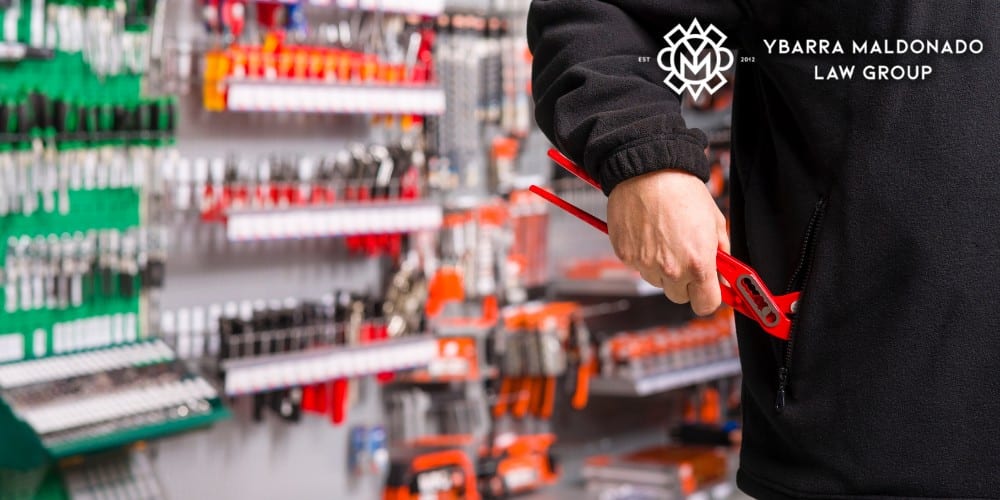SHOPLIFTING LAWYER PHOENIX, AZ
PRACTICE AREAS
DON’T HESITATE TO REACH OUT TO US!
Our Law Firm is committed to becoming the best Law Firm for Latino, migrant, and Spanish speaking communities in Arizona.
Top Phoenix Shoplifting Attorney

Shoplifting may seem like a minor offense, especially if you only steal a candy bar, but suspects can suffer major consequences inside and outside of the courtroom. Aspects of daily life including immigration status and job opportunities can be complicated for former shoplifters. That’s why it’s important to have an experienced shoplifting attorney on your side to achieve the best chance at a positive outcome. Call Ybarra Maldonado Law Group at 602-910-4040 today to schedule your case evaluation with a Phoenix shoplifting lawyer.
What Are the Types of Theft Crimes?
There are numerous types of theft crimes, all of them legally different. So what’s the difference between theft, shoplifting, burglary, and robbery?
- Theft: taking physical possession of property or assets without permission and with no intention of returning it.
- Shoplifting: the act of knowingly and purposely entering a store during business hours and taking an item without paying for it.
- Burglary: the act of entering a place or company without permission and taking property without telling the owner. Burglary in the first degree occurs when the offender knowingly possesses explosives, a deadly weapon, or a dangerous instrument while conducting a theft.
- Robbery: using force, pressure, or intimidation to successfully take or attempt to steal property.
Additionally, something is considered a “continuing criminal episode” if someone commits three or more theft crimes within a 90-day period. The value of each theft crime instance must be at least $1,500.
What Is Considered Shoplifting?

In Arizona, the law defines shoplifting as “knowingly removing an item from a retail store without paying for it.” The store could be a convenience store, clothing boutique, etc. as long as it’s a commercial business operation that displays and sells merchandise. It is one of the most common forms of prosecution in the state.
How Long Does Shoplifting Stay on Your Record in Arizona?
Shoplifting is considered a misdemeanor and unfortunately, in Arizona, misdemeanor and felony convictions remain on your record until you reach the age of 99. However, the law does allow you to request that the court set aside convictions that qualify, but the conviction will not be removed from your criminal record. When a full background check is run, the one running the background check will still see the conviction on your record with a note that the conviction has been set aside.
Arizona Shoplifting Laws
As stated previously, the basic definition of shoplifting is stealing something from a store without paying for it. But Arizona law specifies other types of theft as shoplifting as well.
- Stealing items by charging someone without their consent
- Paying less than the original price by switching or altering price tags or labels
- Transferring items from one container to another
- Purposely hiding an item in order to steal it
Classes of Shoplifting
Shoplifting laws and charges vary from state to state. However in Arizona, shoplifting charges depend on the value of a stolen item. In other words, the more an item costs, the more serious the charge.
Class 1 Misdemeanor Shoplifting
The least serious shoplifting charge is a class one misdemeanor in which a jury may charge a suspect for stolen items valuing less than $1,000. Penalties for this charge include:
- Maximum jail sentence of six months
- $2,500 fine
- Probation for up to three years
Class 6 Felony Shoplifting
In Arizona, a jury may charge a suspect with a class six felony if they stole an item valued between $1,000 and $2,000. Juries will also charge a suspect with a class six felony if they stole a gun valued less than $1,000. If a suspect commits a class six felony, these are the consequences:
- 6-18 months of jail time
- Paying a $150,000 fine
- Up to three years of probation
Class 5 Felony Shoplifting
Meanwhile, a jury will charge a suspect with a class five felony when the stolen items cost more than $2,000 or when a suspect helps a group shoplift. Possible penalties for a class five felony include:
- Nine months to two years in jail
- Maximum fine of $150,000
- Up to three years of probation
Class 4 Felony Shoplifting
In Arizona, a jury may charge you with a class four felony if you stole an item valued between $3,000 and $4,000. Stealing a car engine or transmission is also a class four felony regardless of what it’s worth. Additionally, you can be charged with a class four felony if you have two previous shoplifting incidents within the past five years. If you’re charged with a class four felony for shoplifting, you can be penalized with:
- 18 months to three years in jail
- Up to $150,000 fine
- Up to three years of probation
Class 3 Felony Shoplifting
A jury may charge you with a class three felony in Arizona if you steal an item valued between $4,000 and $25,000. A first time offender can possibly face between three-and-a-half-years to 25 years in prison.
Class 2 Felony Shoplifting
In Arizona, a class two felony is the most serious shoplifting offense. A jury can charge you with a class two felony if you steal an item worth more than $25,000. You can serve between five to 35 years in prison for this offense.
What are the Long Term Consequences of Shoplifting?

Not only can you suffer the consequences of shoplifting inside the courtroom, but outside the courtroom too. In Arizona specifically, shoplifting charges have such severe consequences outside the courtroom because these crimes are known as a “crime involving moral turpitude” (CIMT). In other words, the state believes that shoplifting is generally considered immoral and corrupt. Additionally, a conviction for a CIMT crime can impact a shoplifter’s professional licenses, immigration, employment background checks, security clearance, DPS fingerprint clearance card, housing, and loans.
Professional Licenses
Doctors, lawyers, accountants, and insurance salesmen are among those who have to report a shoplifting conviction. Because shoplifting is a CIMT crime in Arizona, many professionals must disclose charges and convictions for offenses that involve legally immoral behavior to licensing boards.
Immigration
A shoplifting conviction also poses problems for immigration. Under U.S. law, theft convictions are enough to deport an immigrant depending on the person, the time frame, and the specific crime committed. In these cases, it is essential to work with a criminal immigration lawyer for your case.
Employment Background Checks
If you’re found guilty of shoplifting, many employers won’t hire you. This is true for major corporations and retail.
Security Clearance
If you want to work in any government position, a crime-free background check is necessary.
DPS Fingerprint Clearance Card
If a jury has ever convicted you of shoplifting, you can have your DPS fingerprint card suspended as a result.
Housing and Loans
If you have a shoplifting conviction on your record, you may not be able to receive any type of loan. Additionally, a shoplifting conviction can complicate your chances of buying a house. Generally, you must report shoplifting on a mortgage application.
Do I Need a Criminal Defense Attorney for Shoplifting Charges?
Although shoplifting is classified as a petty theft crime, it is a serious criminal offense. An offense that comes with harsh penalties that can affect your present and future situations. These cases can be quite complex so hiring a Phoenix criminal defense lawyer can help you build a case to possibly reduce your charges and protect your rights. Our attorneys at Ybarra Maldonado Law Group have years of experience fighting for clients that deserve to have their voices heard.
Common Defenses in Shoplifting Cases

Another reason why working with an experienced shoplifting attorney is crucial is because they can potentially dismiss or reduce your case. Below are some of the most common defenses used to drop shoplifting charges.
Lack of Criminal Intent
In Arizona, shoplifting law says that a thief must intend to permanently deprive a store owner of merchandise. A jury can’t convict a thief if the jury can’t prove intent. For example, if you paid for some items but forgot to pay for other items, Arizona requires proof that you specifically intended to steal the forgotten items. Sometimes, forgetting to pay for an item is a simple mistake because people will put it in their purse or pocket with full intent to pay.
Lack of Knowledge or Mistake of Fact
Another common defense that someone has in shoplifting cases is if someone switches price tags or packaging. When this happens, a shopper may unknowingly pay the wrong price for an item. Therefore, a jury should not charge the person with shoplifting.
Lack of Motive
If a suspect has no previous history of shoplifting or obviously had the means to pay for the stolen item, then a shoplifting attorney can argue that there was a lack of motive. This defense can also suggest that the shoplifting incident was basically an accident.
Unknowingly Passing a Point of Purchase
This defense is a common mistake that almost everyone commits at some point. If someone unknowingly walks past a register while holding an item, store owners can attempt to charge them with shoplifting. Incidents such as this are becoming even more common as more stores move towards automated checkouts.
Value Defense
A shoplifting attorney must prove the value of the stolen item beyond a reasonable doubt. This defense is most successful with class six shoplifting charges, which is when a stolen item costs between $1,000 to $2,000. This defense can also work for cases in which the stolen item has little to no value.
Constitutional Violations
Common constitutional issues that come up during shoplifting cases include:
- Authorities failing to recite Miranda rights
- Law enforcement forcing suspects to confess
- Unlawfully detaining suspects or unlawfully seizing items
- Lack of probable cause or reasonable suspicion
Unreliable Investigation and Evidence
With this technique, your attorney will attack the quality of law enforcement’s investigation as well as the evidence used against you. Your attorney will consider witness quality and statements, police record keeping quality, police reports quality, and the value of the items stolen.
Knowledge and Mental State
In Arizona, a crucial point in shoplifting laws is whether or not a suspect left a store with the intent of not paying for the item. If your attorney can prove that you didn’t have that intention, then a jury could potentially drop your charge.
Mistaken Identity
If the basis of your shoplifting charge is a witness’s identification, then your attorney can potentially debunk this. This is because witness testimonies are the least reliable type of evidence. Incorrect identification by witnesses frequently leads to wrongful arrests and wrongful convictions.
Call an Experienced Phoenix Shoplifting Attorney

At Ybarra Maldonado Law Group, we have successfully defended clients accused of shoplifting in plea negotiations and at trial. We have even negotiated a suspended sentence. If you find yourself facing criminal charges for theft crimes and you need an experienced Phoenix shoplifting lawyer – don’t hesitate! We have successfully defended clients accused of organized retail theft, armed robbery, and other serious crimes. Call or text us today at 602-910-4040 for a case evaluation.

DEDICATION
We are dedicated to maintaining a strong bond and deep roots to our communities in Arizona.

EXPERIENCE
Our collective skills and experience enable us to provide a high level of award winning service.

AVAILABILITY
Our attorneys are available day or night so you do'nt have to wait for the help and support.







